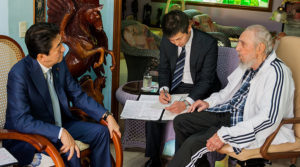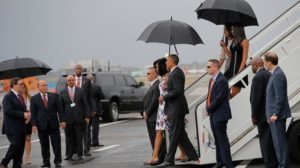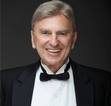Gerard Dion's Blog, page 12
October 19, 2016
Obama Just Opened the Door for Castro’s Spies
Normalization of relations with Fidel Castro’s Cuba has been one of the big foreign policy initiatives of Barack Obama’s presidency. During his two terms in the White House, Washington has overturned more than a half-century’s worth of American policies toward the Communist regime in Havana.
Calling that legacy a “failed approach,” Obama’s outreach to Havana, particularly in his second term, has been pronounced, including a visit by the president and the first lady to Cuba. By the time he leaves office in three months, Obama will have substantially re-normalized relations with the Castro regime.
human rights groups, who note that Washington’s gifts to Havana have not been reciprocated with greater respect for democracy and the rule of law in Cuba, as many had anticipated. In the words of Amnesty International, “Despite increasingly open diplomatic relations, severe restrictions on freedoms of expression, association and movement continued. Thousands of cases of harassment of government critics and arbitrary arrests and detentions were reported.”
U.S. Government in its re-normalized dealings with Havana. Presidential Policy Directive 43 is likely to be this president’s last push on Cuban matters, and its call to Congress to drop the Cold War-legacy embargo on the Castro regime seems like to fall on deaf ears.
Most of PDD-43’s guidance won’t impact average Americans, unless they happen to travel to Cuba. Obama has now permitted them to bring back as much Cuban rum and cigars as they like—something Americans were last able to do when Dwight Eisenhower was in the White House.
There’s the usual Obama boilerplate about promoting democracy and human rights in Cuba, though there’s nothing in PDD-43 that seems likely to make any impression on Havana. The document omits the word “Communist” entirely. Cubans expecting this president to demand concessions from the Castro regime in exchange for trade favors and diplomatic recognition have been let down yet again by Barack Obama.
Obama has unilaterally declared a truce in our half-century SpyWar with Cuba, but there’s no indication Havana has done the same.
Some of PDD-43’s guidance will have important national security implications. It directs the Defense Department to expand its relationship with Havana, especially in “humanitarian assistance, disaster relief, and counternarcotics in the Caribbean.” It further orders the Pentagon to “support Cuba’s inclusion in the inter-American defense system…which will give Cuba a stake in hemispheric stability.”
It’s far from clear that Havana’s Communist rulers—whose entire worldview for more than a half-century has been based on resistance to Yankee hegemony—actually want to be part of any American-led defense apparatus in our hemisphere, but the Pentagon follows orders, so we can expect the U.S. military to have more meetings and conferences with Cuban counterparts at the table.
Perhaps the most curious aspect of PDD-43 is what it tells our Intelligence Community to do. Obama has ordered American spies “to find opportunities for engagement on areas of common interest through which we could exchange information on mutual threats with Cuban counterparts.”
That wording is intentionally vague, as spies like it, and it’s not clear if anything will come of it, beyond low-level information sharing. Nevertheless, it’s apparent that Obama is declaring a truce in the SpyWar that’s raged between Washington and Havana since the early 1960s. In PPD-43, the White House has omitted important facts about the intelligence relationship between the United States and Cuba—namely how hostile it has been for more than 50 years.
For Havana, America possesses the only two existential threats to their Communistsystem: the U.S. military, which outclasses Cuba’s armed forces a hundredfold, and the Cuban exile community, which Havana has long considered a regime-change cadre in waiting. Cuba therefore has spied intensely on America practically from the moment Fidel Castro took power in 1959.
It needs to be said that Cuban espionage against the United States has been impressive. Well trained by the Russians in spycraft, Havana’s intelligence services have consistently beaten Americans in the SpyWar, displaying a discipline andseriousness that the regime lacks in other areas.
Although it’s practically unknown to the American public, Cuba has consistently ranked among the Big Four counterintelligence threats to our government (the others are Russia, China and Israel, in case you wondered). Havana punches well above its weight in espionage and poses a real threat to our national security—not least because the secrets it steals from us with depressing ease don’t always stay in Havana. Perennially short of cash and lacking much of a legitimate export economy, the Castro regime has a well-developed habit of selling purloined American information to third countries such as Russia, China and Iran.
and turned into double agents for Havana.
This spy debacle, which revealed that the CIA had been decisively outfoxed by Havana, made too little impression on Congress or the public. Needed Intelligence Community reforms did not follow. Neither is there any indication that things have gotten much better for the CIA in the SpyWar against Cuba since 1987.
The so-called Wasp Network, consisting of five Cuban intelligence officers and their many agents, which the FBI rolled up in 1998, stretched deep into the Cuban émigré community in Florida. The Cubans had even orchestrated the deaths of four anti-Castro activists in a notorious 1996 incident.
However, the Wasp Network had also penetrated U.S. military installations in Florida, including U.S. Southern Command in Miami, which is the Pentagon’s headquarters for most of its Latin American operations. Havana has consistently been able to recruit agents inside the Pentagon and our Intelligence Community. The remarkable case of Ana Belén Montes, a Defense Intelligence Agency senior analyst who spied for Cuba her entire Pentagon career, caused less public waves than it merited, in part because she was arrested just 10 days after the 9/11 attacks, when media attention was elsewhere.
She was unmasked thanks to diligent counterintelligence analysis by several of our spy agencies, over years, and we learned from the Montes case that she was only one of several Cuban moles lurking inside the Beltway. One of those spies was caught in 2009. That was Kendall Myers, a retired State Department analyst, who spied for Havana for three decades, with his wife’s assistance. His motivation, like Montes, was ideological, not financial: Myers had a serious man-crush on Fidel Castro.
Other Cuban moles remain undetected. One may have been Alberto Coll, who left the Naval War College in 2005, where he was a dean, under a cloud. Coll, a former Pentagon senior official, was caught lying on official forms. A Cuban émigré who came to the United States as a child, Coll had taken trips to Cuba that he failed to tell security personnel about, while he had friendships with Cuban spies he likewise did not disclose, as he was required to. Coll was never charged with espionage, but many Washington counterspies think his ties to Havana went deeper than has ever been publicly revealed.
American counterintelligence hands who know the Cubans best have no doubt that some of those moles remain active in and around Washington. What’s worse is that President Obama has now opened the door to increased Cuban espionage against our country. Soon Cuba will have brand-new diplomatic missions all over the United States and, per standard practice, they will all contain a hefty number of spies posing as diplomats.
Given how successful Havana has been at conducting espionage against us, on our own soil, without such large embassies and consulates, there’s every reason to expect Cuban spying to get more aggressive—and effective—in the near future. President Obama has unilaterally declared a truce in our half-century SpyWar with Cuba, but there’s no indication Havana has done the same.
John Schindler is a security expert and former National Security Agency analyst and counterintelligence officer. A specialist in espionage and terrorism, he’s also been a Navy officer and a War College professor. He’s published four books and is on Twitter at @20committee.
October 18, 2016
The Time Bill Clinton Fought Like Hell To Stop Refugees In His State
FLASHBACK: The Time Bill Clinton Fought Like Hell To Stop Refugees In His State
Posted By Amber Randall On 9:23 PM 10/16/2016 In | No Comments
5275461
Former President Bill Clinton faced his own refugee problems when he tried to prevent Cuban refugees from settling in Arkansas in the 1980s.
Clinton, serving as the governor of Arkansas, protested President Jimmy Carter’s orders to house Cuban refugees in his state. Then-Cuban President Fidel Castro faced a bad economy in the country. Because of the country’s economic problems, he allowed 125,000 Cubans leave and go to America.
Carter, who at the time said Americans must welcome the refugees with “open arms,” told Clinton Arkansas’s Fort Chaffee should hold some of them.
Fort Chaffee had been used as a training and prisoner of war camp during World War II, holding almost 3,000 German POWs. In the late 70s, the fort served as a place to process Southeast Asia refugees and connect them with American sponsors.
This time, Carter ordered Clinton to use it to house almost 20,000 Cuban refugees.
Publicly, it seemed that Clinton was in favor of the idea, telling Arkansans that the country “must accept our responsibility as the leader of the free world.” In private, Clinton objected to the idea and tried to get around it.
He suggested to the White House that the Cubans be screened before entering the U.S. Those who did not pass screening could be housed elsewhere, he proposed.
“Sure there is. We still have a base at Guantanamo, don’t we?” Clinton said in his memoir “My Life.” “And there must be a gate in the fence that divides it from Cuba. Take them to Guantanamo, open the door, and march them back into Cuba.”
The White House dismissed his proposal and sent 20,000 refugees to Arkansas by May 20, much to the dismay of the locals. About six days after the refugees arrived, a “couple hundred” escaped from the fort and walked the streets chanting “Libertad! Libertad!”
Clinton spoke to Carter and “demanded that someone be given authority to keep the Cubans on the base.”
Lynn Merechka, a former guard at Fort Chaffee, spoke on the Travel Channel about the dismal conditions at the fort.
“Some of these guys were in prison from the time they were 12 years old. And that’s all they knew was prison life. They had American people who would sponsor them to get them a job, a house, stuff like that,” Merechka said. “Once they figured out they weren’t going to leave, some of them got kind of desperate, saying ‘Hey, I just traded one prison for another.”
According to Merechka, there were fights almost everyday and stabbings were a regular occurrence.
One thousand Cubans rioted and escaped the fort June 1, 1980. They battled with the National Guard and State Police; in the end, 62 refugees had injuries and police arrested another 46.
Carter promised Clinton that he would not send more refugees after the riot, but a couple of months later, he called to inform Clinton that more refugees would be coming.
Clinton asked for them to be placed elsewhere and exploded on the White House personnel who gave him the news.
Article printed from The Daily Caller: http://dailycaller.com
URL to article: http://dailycaller.com/2016/10/16/fla...
October 2, 2016
BOMBSHELL: Donald Trump Caught Violating Cuba Embargo With Shady Business Deals
On Wednesday night’s episode of “The Rachel Maddow Show,’ Maddow revealed that she had exclusive access to a new Newsweek report detailing Donald Trump’s ties to communist Cuba The article alleges that Trump’s company conducted business in Cuba despite a US trade embargo.
A company controlled by Donald Trump, the Republican nominee for president, secretly conducted business in communist Cuba during Fidel Castro’s presidency despite strict American trade bans that made such undertakings illegal, according to interviews with former Trump executives, internal company records and court filings.
Keep in mind that, as of this article’s writing, we do not have the full Newsweek story, but if this is accurate then the GOP nominee’s company would be direct violation of the law. The documents allege that his company spent at least $68,000 dollars in Cuba and then, on the advice of a consulting firm, linked the money to a charitable cause to make it appear legal. The article also alleges that the GOP nominee had full knowledge of this illegal business venture.
‘ Documents show that the Trump company spent a minimum of $68,000 for its 1998 foray into Cuba at a time when the corporate expenditure of even a penny in the Caribbean country was prohibited without government approval. But the company did not spend the money directly. Instead, with Trump’s knowledge, executives funneled the cash for the Cuba trip through an American consulting firm called Seven Arrows Investment and Development Corporation. Once the business consultants traveled to the island and incurred the expenses for the venture, Seven Arrows instructed senior officers with Trump’s company, then called Trump Hotels & Casino Resorts, on how to make the venture appear legal by linking it after-the-fact to a charitable effort.’
The timing of this business venture is also interesting as it coincides with Trump’s first foray into presidential politics. In 2000, Trump sought the nomination of the Reform Party. As part of his campaign, he spoke to a group of Cuban Americans where he promised to maintain the Cuban embargo and pledged that his company would not do business in Cuba until Castro was removed from power. However, if this report is accurate, then Trump’s company would have already done business in Cuba making his promise a lie.
‘The payment by Trump Hotels came just before the New York business mogul launched his first bid for the White House by seeking the nomination of the Reform Party. On his first day of the campaign, he traveled to Miami where he spoke to a group of Cuban-Americans, a critical voting bloc in the swing state. Trump vowed to maintain the embargo and never spend his or his companies’ money in Cuba until Fidel Castro was removed from power. He did not disclose that, seven months earlier, Trump Hotels already had spent money sending consultants on the secret trip to conduct business in Havana.’
Report of Trump spending in Cuba could hurt his chances in pivotal Florida
Report of Trump spending in Cuba could hurt his chances in pivotal Florida
The GOP presidential nominee is out on the trail ahead of the general election in November.
Sept. 29, 2016 Donald Trump waves before boarding a plane after a campaign rally in Bedford, N.H. John Locher/AP
September 29
Republican presidential candidate Donald Trump came under intense scrutiny Thursday for allegations that he knowingly violated the U.S. embargo on Cuba in the 1990s, a report that could hurt him among Cuban Americans in the crucial state of Florida.
A story published in Newsweek said Trump’s firm spent as much as $68,000 on a “foray” exploring business possibilities in Cuba in 1998, which would be a clear violation of the strict embargo in place at the time
Trump spokeswoman Kellyanne Conway suggested in a television interview Wednesday that Trump had indeed spent money exploring business ventures in Cuba. But Conway later told The Washington Post that she “did not say he broke the law or violated the embargo.”
Trump himself denied the allegations during an interview in New Hampshire, where he campaigned Thursday, and sought to discredit the reporter who wrote the story.
“I never did business in Cuba. There’s this guy who has a very bad reputation as a reporter. You see what his record is. He wrote something about me in Cuba. No, I never did anything in Cuba. I never did a deal in Cuba,” he told NH1 News
[image error]
President Obama, right, and his Cuban counterpart, Raul Castro, wave to cheering fans as they arrive for a baseball game between the Tampa Bay Rays and the Cuban national baseball team in Havana on March 22, 2016. (Rebecca Blackwell/AP)
The report could become a significant political liability for Trump among Cuban Americans in Florida, a key battleground state in his fight against Democratic rival Hillary Clinton. The two candidates are in a virtual dead heat in the state, according to the RealClearPolitics polling average.
Susan MacManus, a nonpartisan Florida political analyst, said the issue could cause great concern among older Cuban
Americans in the state, who are firmly pro-embargo. Those voters have expressed disdain for the Obama administration’s decision to open relations with Cuba.
“The hard-liners in the Cuban community are very high-turnout voters. And they’re shrinking in number,” she said. “Trump just went down there and had a special meeting with these people to try to shore up support with them. And, so, just when Trump was making inroads and assuring that community that he was on their side, then this story comes out.”
Ana Navarro, a Florida-based conservative strategist opposed to Trump, said that “it is never a good thing when voters feel played and find out the candidate they are supporting is a hypocrite on an issue that carries the emotion that Cuba policy does.”
[Opening to Cuba is ‘irreversible,’ senior Obama aide says]
Sen. Marco Rubio (R-Fla.), a former primary challenger of Trump’s who is running for reelection in November, urged the Trump campaign to address questions about the case but said he would not comment further until more information is known
“The article makes some very serious and troubling allegations. I will reserve judgment until we know all the facts and Donald has been given the opportunity to respond,” Rubio said in a statement.
According to Newsweek, the fees associated with a business trip to the island by Trump representatives were paid by Trump Hotels and Casino Resorts through a consulting firm called Seven Arrows Investment and Development. The consulting firm later said the trip had been taken on behalf of a Catholic charity.
Trump blasted President Obama for a “one-sided deal for Cuba” this month during a campaign event in Florida. He said the move to normalize relations would benefit the Castro regime. He has vowed to reverse Obama’s efforts to open U.S.-Cuba relations if he is elected president, “unless the Castro regime meets our demands — not my demands, our demands.”
Clinton told reporters aboard her plane that Trump’s business exploration in Cuba “appears to violate U.S. law, certainly flout American foreign policy, and he has consistently misled people in responding to questions about whether he was attempting to do business in Cuba.”
“This adds to the long list of actions and statements that raise doubts about his temperament and qualification to be president,” she added.
[Trump’s newest legal problem: Cuba]
Conway, during a tense appearance on ABC’s “The View,” appeared to say that Trump had spent money in Cuba but emphasized that “he decided not to invest there.”
“I think they paid money, as I understand from the story, in 1998 — and we’re not supposed to talk about years ago when it comes to the Clintons,” Conway said amid cross-talk.
“So the question is: Did he spend money? He’s very critical of Cuba, he’s very critical of Castro, he’s been critical of Cuba,” she said. “He gave a speech the very next year to the Cuban American National Foundation in Miami critical of those who want to do business with Castro.”
In that 1999 speech, Trump denounced the Castro regime.
“I’ve had a lot of offers and sadly it’s all been very recently to go into Cuba on deals, business deals, real estate and other deals. And I’ve rejected them on the basis that I will go when Cuba is free,” Trump said at the time, according to a video of his remarks. “Putting money and investing money in Cuba right now doesn’t go to the people of Cuba. It goes into the pockets of Fidel Castro. He’s a murderer, he’s a killer, he’s a bad guy in every respect.”
Conway said several times Thursday that Trump did not ultimately invest money on the island and sought to focus attention on foreign donations to Bill and Hillary Clinton’s family foundation.
“But again, we’re talking about, did his hotel invest money in 1998 in Cuba? No. Did she get money from seven foreign governments while she was secretary of state? Yes.”
Sean Sullivan, Ed O’Keefe and Anne Gearan contributed to this report
Trump broke Cuban embargo, report says, roiling Miami politics
Miami Hreald
Trump broke Cuban embargo, report says, roiling Miami politics
Read more here: http://www.miamiherald.com/news/polit...
Donald Trump spoke to the Cuban American National Foundation in 1999, casting himself as a pro-embargo hardliner who refused to do potentially lucrative business in Cuba until Fidel Castro was gone. C-SPAN
By Patricia Mazzei
pmazzei@miamiherald.com
Revelations that Donald Trump’s hotel and casino company secretly spent money trying to do business in Cuba in violation of the U.S. trade embargo roiled Miami politics Thursday, forcing top Cuban-American Republicans to express concern about Trump’s dealings while maintaining that the allegation isn’t reason enough to disavow the presidential nominee yet.
Trump Hotels & Casino Resorts paid at least $68,000 to a consulting firm in late 1998 in an attempt to give Trump’s business a head start in Cuba if the U.S. loosened or lifted trade sanctions, according to a front-page Newsweek report titled “The Castro Connection.” The consulting firm, Seven Arrows Investment and Development Corp., later instructed the casino company to make the spending appear legal by saying it was for charity.
Trump’s most prominent local Cuban-American supporter, U.S. Sen. Marco Rubio, called the report “troubling.”
“The article makes some very serious and troubling allegations,” he said in a campaign statement. “I will reserve judgment until we know all the facts and Donald has been given the opportunity to respond.”
U.S. Rep. Mario Diaz-Balart of Miami, who has espoused a strong pro-embargo position throughout his political career, struck a similar tone, saying for now that he gives Trump the benefit of the doubt.
“What we have so far are unnamed sources,” he cautioned reporters, calling the Newsweek report “preliminary.” “It’s important to see what the facts are.”
Trump rejected Newsweek’s reporting in an interview broadcast Thursday night.
“I never did business in Cuba. There’s this guy who has a very bad reputation as a reporter. You see what his record is, he wrote something about me in Cuba,” Trump told New Hampshire’s NH1 station, according to Politico. “No, I never did anything in Cuba. I never did a deal in Cuba.”
Hillary Clinton pounced on the story, saying it exposed a “pattern” of obfuscation by Trump on his business dealings. Clinton is scheduled to visit Coral Springs on Friday, with polls showing her and Trump essentially tied in Florida, the nation’s largest swing state.
“We already know about his tax returns that he refuses to release, but today we learned about his efforts to do business in Cuba, which appear to violate U.S. law — certainly flout American foreign policy,” Clinton told reporters.
“He has consistently misled people in responding to questions about whether he was attempting to do business in Cuba. So this adds to the long list of actions and statements that raise doubts about his temperament and qualification to be president and commander in chief, and also really continue to stonewall the American voters who deserve to know this information before they cast their votes.”
Clinton gave a speech at Florida International University last year advocating that the U.S. lift the embargo, a stance that would have seemed unthinkable just a few years ago coming from a major party nominee campaigning in the nation’s largest swing state.
Trump, on the other hand, has hardened his Cuba position recently, proclaiming at a Miami rally that he would reverse President Barack Obama’s re-engagement policy toward the island’s communist regime. A hand-picked group of largely Cuban-American Hispanics met Trump in Little Havana on Tuesday with gushing praise.
Last year, Trump had sounded far less vexed by Obama’s Cuba proposal — even though in a November 1999 speech to the Cuban American National Foundation in Miami he cast himself as a pro-embargo hardliner who refused to do potentially lucrative business on the island until Fidel Castro was gone.
“If the embargo is not continued, then the Bay of Pigs and all the people who died or were injured and those who are living monuments of it will be hurt by this government a second time,” Trump said then. The crowd regaled him with cries of “Viva Trump!”
At the time, Trump was flirting with running as a Reform Party presidential candidate. President Bill Clinton was loosening U.S. sanctions against Cuba.
“CANF did not have, and until this day does not have, any knowledge concerning the alleged plans by the Trump organization to circumvent the restrictions of the US Embargo,” the foundation said in a statement Thursday.
Trump’s 1999 speech took place less than a year after Trump’s company hired the Seven Arrows consultancy to explore business opportunities in Cuba, according to Newsweek. Trump had turned to the same firm to try to develop a Florida casino with the Seminole Tribe.
Neither Trump nor Richard Fields, the head of Seven Arrows consulting, responded to Newsweek’s requests for comment. Trump later sued Fields, and former Trump adviser Roger Stone suggested to Politico Florida late Wednesday that Fields might have acted on his own, without Trump’s approval, in looking into a possible Cuba venture. Newsweek, however, cited an anonymous former Trump executive who claimed “Trump had participated in discussions about the Cuba trip and knew it had taken place.”
When Seven Arrows billed Trump’s company to reimburse its Cuba work, according to Newsweek, it suggested using “Carinas Cuba” as charitable cover to get an after-the-fact Cuba license from the U.S. Office of Foreign Asset Control. OFAC doesn’t issue licenses after companies have already gone to Cuba, and the Catholic charity is actually named Caritas Cuba.
Newsweek wasn’t the first news outlet to question Trump’s commitment to staying away from Cuba. Bloomberg Businessweek reported in July that Trump Organization executives traveled to Havana in late 2012 or early 2013 to scout potential golf-course sites — again under a White House that favored closer Cuba ties. Politico Florida reported Thursday that John Kavulich, president of the U.S.-Cuba Trade and Economic Council, said someone from the Trump organization approached him in the mid- to late 1990s about doing business in Cuba.
Unlike other Hispanics, Cuban Americans lean heavily for the GOP: They make up about 72 percent of registered Republicans in Miami-Dade County. However, a recent Florida International University poll showed potential political trouble for Trump: Miami-Dade Cubans only narrowly backed him over Clinton. The same poll showed a majority of local Cuban Americans for the first time clearly favor lifting the embargo.
Engage Cuba, which lobbies for lifting the embargo and other U.S. sanctions, suggested Thursday that Trump should return to viewing Cuba as he did in 1998
“Clearly Mr. Trump, a businessman, has long recognized the economic benefits of engaging with Cuba,” communications director Madeleine Russak said in a statement. “No business in the world, including a Trump company, would continue to pursue a strategy that has failed for 55 years, and I would imagine that Mr. Trump would expect nothing less from the U.S. government.
“It’s unfortunate that the presidential nominee has changed his tune in regards to Cuba, seemingly to pander to an outdated perception of Cuban-American sentiment in South Florida.”
The Newsweek report reverberated in Florida beyond the presidential race. Gov. Rick Scott said he hasn’t read the story and declined to opine on it, calling it a distraction fueled by Clinton supporters.
“I’ve not talked to Trump about it,” he told reporters in Orlando. “I assume this is more of what Hillary Clinton keeps doing.”
Rubio’s Democratic challenger, U.S. Rep. Patrick Murphy of Jupiter, accused the incumbent of failing to stand up for his principles.
“Marco Rubio can’t even stand up to Donald Trump when he violates a Cuba policy that Rubio has made a focal point of his political career,” Murphy communications director Joshua Karp said in a statement. “Marco Rubio should disavow Trump or admit that there really isn’t an issue that matters to him more than his own personal political ambition.”
“Doing business in Cuba is illegal, absolutely,” Diaz-Balart conceded. But he also credited Trump with blasting Castro and promoting the embargo in 1999. The timing of that Miami speech, so soon after the Trump’s Cuba foray as reported by Newsweek, didn’t strike Diaz-Balart as political double-speak but rather as an indication that Trump decided to steer clear of Cuba despite facing business pressure to do otherwise.
Two other Miami Republicans in Congress, Reps. Carlos Curbelo and Ileana Ros-Lehtinen, have refused to back Trump. Curbelo told the Miami Herald on Thursday that Trump “should explain what happened in 1998.”
“No one is above the law,” he said, though Newsweek reported that the statute of limitations against any action against Trump has expired.
Ros-Lehtinen was unavailable for comment because she was en route to Israel for the late President Shimon Peres’ funeral.
In Washington, Mauricio Claver-Carone, who heads the staunchly pro-embargo U.S.-Cuba Democracy PAC, argued Trump “never transacted business with the Castro regime” because Trump’s money went to the consulting firm. Claver-Carone cited a June 25, 1999, Trump op-ed in the Miami Herald as proof that Trump had reconsidered trying to find a way to enter the Cuba market.
Trump had reconsidered trying to find a way to enter the Cuba market.
“Several large European investment groups have asked me to take the ‘Trump Magic’ to Cuba,” Trump wrote. “They have ‘begged’ me to form partnerships to build casino-hotels in Havana. With the influx of foreign tourists, we would make a fortune, they promise, and they are no doubt right. They are also right to say that this type of arrangement would allow me to skirt the U.S.-imposed embargo
“But rushing to join those who would do business in Cuba would do more than that,” Trump continued. “It would place me directly at odds with the longstanding U.S. policy of isolating Fidel Castro. I had a choice to make: huge profits or human rights. For me, it was a no-brainer.”
“Perhaps he deserves some kudos for this,” Claver-Carone posited.
On Miami’s popular Spanish-language radio stations, listeners apparently backing Trump also found contorted ways to try to justify Trump’s actions.
“Everybody’s done business in Cuba,” one WAQI-AM 710 Radio Mambí listener said,
“Yes,” host Bernadette Pardo replied, “but here it’s illegal.”
Miami Herald staff writers Mary Ellen Klas and Amy Sherman contributed to this report.
Report: Trump violated law by doing business in Cuba
Report: Trump violated law by doing business in Cuba
By Patrick Oppmann, CNN Newsweek: Trump violated Cuba embargo
Story highlights
US citizens are banned from spending any funds on the island
The US and Cuba restored relations last year, but a trade embargo remains in place
Havana (CNN)A new report says Donald Trump sought to invest in Cuba in the late 1990s, raising the possibility that the GOP presidential nominee violated US law.
According to Newsweek, Trump Hotel executives visited the communist-run island in 1998 to meet with officials there about doing business.
The company spent over $68,000 on the trip and does not appear to have obtained the necessary US treasury license to spend money in Cuba, Newsweek reported.
Obama picks envoy to Havana as Cubans await change
“They clearly knew what the rules were and flouted them,” the article’s author, Kurt Eichenwald, said on CNN’s “New Day.”
The Trump campaign did not respond to CNN requests for comment. But on ABC’s “The View,” Trump campaign manager Kellyanne Conway denied he had broken the law.
“He’s very critical of Cuba.
He’s very critical of (Fidel) Castro,” Conway said.
“We’re talking about did his hotel invest money in 1998 in Cuba?
No.”
She later tweeted,
“For those getting hard news fr. @TheView, biz officials tell me Trump:
1) did no biz in Cuba
2) respected embargo
3) was critical of Castro.”
Under the five-decades-old trade embargo
— which can only be lifted by Congress
— US citizens are banned from spending any funds on the island.
The US and Cuba restored relations last year and President Barack Obama has eased some sanctions to allow more US travel and commerce with Cuba.
At a rally in Miami earlier this month, Trump blasted the Cuba policy changes, an apparent shift from past statements in which he supported the reopening of diplomatic relations after more than 50 years.
“All of the concessions that Barack Obama has granted the Castro regime were done through executive order, which means the next president can reverse them and that’s what I will do if the Castro regime does not meet our demands,” Trump said.
The Republican candidate said he could close down the newly reopened US embassy in Havana if Cuba didn’t allow greater political and religious rights for Cubans.
But a Cuban Foreign Ministry official on Wednesday said the island’s government would not respond to Trump’s demands.
“Cuba has always made clear that Cuba’s internal matters aren’t on the negotiating table,” Gustavo Machín, the Foreign Ministry’s subdirector for US affairs, said at a press conference here. “They’re a function of internal decisions by Cuba and the Cuban people.”
For decades, the Cuban-American community has been reliably in the GOP camp and often swung Florida elections to Republican candidates. But in recent years, observers say a generational shift is taking place, and a Florida International University poll of Cuban Americans in Miami-Dade County earlier this month found a majority now support lifting the embargo.
The same survey found 35.5% of Cuban-Americans favor Trump to 31.4% for his Democratic challenger, Hillary Clinton.
September 26, 2016
Castro urges West not to subject Russia & China ‘to threats of deploying nuclear weapons’

Former Cuban leader Fidel Castro (C), Cuba’s President Raul Castro (L) and Venezuela’s President Nicolas Maduro attend a gala for Fidel Castro’s 90th birthday at the Karl Marx theatre in Havana, Cuba, August 13, 2016 © Ismael Francisco / Reuters
“Great powers like China and Russia can’t be subjected to threats of deploying nuclear weapons. They are people of great courage and intelligence,” Castro said in his letter, which was published on the website of the Official Body Central Committee of the Communist Party Of Cuba.
Castro also thanked all of his supporters for all their good wishes: “I want to express my deepest gratitude for the shows of respect, greetings and praise that I’ve received in recent days, which give me strength to reciprocate with ideas that I will send to party militants and relevant organizations,” he wrote in his letter.
READ MORE: Fidel Castro says he’s nearing the end in farewell speech
Castro led Cuba from 1959 until 2008, when he was forced to step down after suffering a severe gastrointestinal illness.
Castro last spoke to the public in April, when he closed the congress of the Cuban Communist party, which is held every two decades. During his speech, the father of the Cuban revolution urged the country to remain true to its socialist ideals when adopting policies to normalize relations with the US.
Nuclear subs, bear cubs & Fidel Castro’s other legendary adventures in the USSR (RARE PHOTOS)

Soviet Communist Party First Secretary Nikita Khrushchev (left) and Cuban Prime Minister Fidel Castro (right) on the Mausoleum attending a rally to mark Castro’s arrival in the USSR. Castro was the first foreign leader to stand on the tribune of Lenin’s mausoleum in Red Square. © Yuryi Abramochkin / Sputnik
The father of the Cuban Revolution and a central mover and shaker in Latin America, Fidel Castro has turned 90. On his birthday, RT shares some exciting stories of the prominent leader’s visit to the Soviet Union.
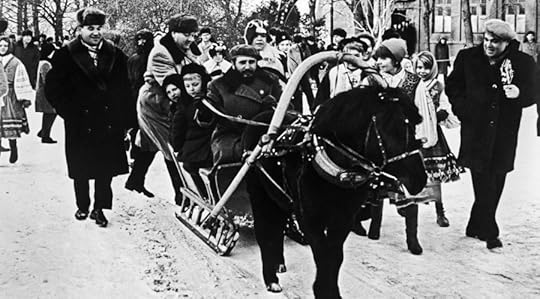
Fidel Castro with Soviet children during his visit to Moscow. Winter of 1963. © Baltermants / Sputnik
Propelled to power by the Cuban Revolution in 1959, and having instantly become a role model for revolutionary movements, Fidel Castro first visited the USSR in 1963, aged 36. Four years prior to his visit, Havana established diplomatic ties with Moscow. Having been the Soviet Union’s ally during the Cold War, relations between the two nations’ leaders cooled in 1962, when USSR’s Nikita Khrushchev removed Soviet missiles from the Caribbean island following an agreement with American President John F. Kennedy. Castro said the Soviet leader did it all behind his back.
To sugar the pill for Castro, Khrushchev proffered him a personal invitation to travel to the USSR. The visit turned out to be a 38-day tour all around the country.

Cuban President Fidel Castro at Borispol airport. © Vasily / Sputnik
Castro arrived in the USSR amid top secrecy in late April 1963. Instead of heading to Moscow, his non-stop flight from Havana landed in Russia’s city of Murmansk. The base of Soviet submarines, located in that northern region in the town of Severodvinsk, was the Cuban leader’s first destination. He was the only foreigner to be allowed to set foot to a nuclear sub, and he got all excited about it. The Soviet military even showed him a loaded nuclear missile.

Chairman of the State Council and Prime Minister of the Republic of Cuba, the leader of the Cuban revolution Fidel Catsro visits the legendary Aurora cruiser in Leningrad. © / Sputnik
Starting from the country’s north, Castro then visited more places in Russia and then Soviet republics than any other foreign and even Soviet leader. Everywhere he went, he got a warm welcome from the Soviet people, and that’s what he said he loved most of all.

Cuban leader Fidel Castro in the Siberian taiga. © Sputnik
When touring Siberia, the Cuban revolutionary leader’s train got surrounded by lumberjacks, who somehow learnt Castro was in their area and refused to leave before they saw him with their own eyes. Fidel heard the noise outside, and went to see. He was caught on the train’s footstep wearing just his under shirt, while outside it was severe Siberian winter. The men didn’t want the legendary figure to leave without talking to them, and offered him a warm quilted jacket. Castro was so touched that he wanted to give the men something back, but only found three cigars in his trouser pocket. He gave them to the large crowd of men, with each of them taking just one puff before passing it on. The scene brought tears to the Cuban’s eyes. “In the West, no one would have behaved that way. A person who got the cigars first would have pocketed them. Now I understand the strength behind the Russian people,” Castro said.

First secretary of the Cuban Communist Party Central Committee Fidel Castro (centre) among the CSKA ice-hockey team players. © Dmitryi Donskoy / Sputnik
On his visit to Tashkent in Uzbekistan, Castro expressed a wish to go to a local department store. Uzbekistan’s minister of trade was put behind the counter to serve the Cuban leader, who was buying a leather belt. Fidel was furious, saying he wanted to meet the ordinary people and not the officials.
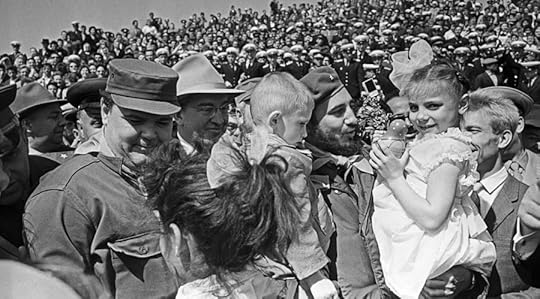
Fidel Castro and children, Volgograd. © Yuryi Abramochkin / Sputnik
Another similar incident that happened in Leningrad (now St. Petersburg) was even reported to Khrushchev. During one of the meetings, Castro was presented with flowers by a little girl. Castro asked her to tell him which kindergarten she attended, and later said he wanted to go there to meet his little friend. Castro’s wish caught officials off guard, and they tried to avoid such a visit by all means, but the Cuban leader insisted. In the end, he was taken to a kindergarten with a shiny plate with the number Fidel remembered, where he was again met by the girl. Castro asked the child to show him around, but the girl replied: “I’m so sorry, I can still get lost, it’s only my second day here!” It turned out that the girl was from a poorer orphanage, and the officials had transferred her to an exemplary one to show off to Castro, and replaced the sign on it.

Cuban leader Fidel Castro (centre) talking to Ustinovka villagers, Kiev Region.© Vasily / Sputnik
Castro criticized the authorities’ “flashiness” at an official dinner later. “You do many things to impress. I don’t need it. You are building a metro in the city, but stop such important works because of the motorcade driving me around, to be able to comfortably pass through the area. I’m not an arrogant man, I could have taken a side road not to disturb,” he told Soviet officials.

Chairman of the State Council and Council of Ministers of the Republic of Cuba, leader of the Cuban revolution Fidel Castro visits a fish factory in Murmansk, USSR. © Vasily / Sputnik
During his visit to Lake Baikal, where he was fishing with Soviet geologists, he was one day approached by a young man with a bear cub. The man said he had traveled through the taiga to see the Cuban revolutionary leader talking to people at some public rally in the region, but accidentally met him in the wilderness of the lake. He gave Castro his bear as a present, which Fidel later named Baikal. The bear then traveled with Castro to Cuba. Although provided with best conditions possible in one of the Cuban leader’s residences, the animal sadly died several years later, unable to adopt to the hot climate of the Caribbean
Japan’s Abe meets Fidel Castro, seeks Cuba’s help in taming North Korea
Cuba’s former President Fidel Castro (R) and Japan’s Prime Minister Shinzo Abe (L) meet in Havana, Cuba, September 22, 2016 © Alex Castro / Reuters
Japanese PM Shinzo Abe has called on Cuba, one of North Korea’s allies, to denounce the country’s troubling nuclear program and use leverage to stop it, as he met with the revolutionary leader Fidel Castro in Havana during his first-ever visit to the country.
Abe has become the first Japanese leader to come to the island state since the Cuban revolution of the 1950s, spearheaded by Castro, who served as president for four decades. The visit falls in line with the strategy of gradual rapprochement with the West pursued by Fidel’s younger brother and Cuba’s current leader, Raul Castro. The policy reached its culminating point with US President Barack Obama traveling to the country in March on an official state visit, the first by a US leader in 88 years.
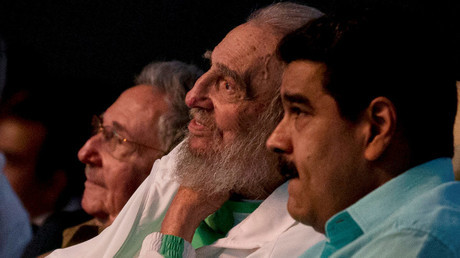 Castro urges West not to subject Russia & China ‘to threats of deploying nuclear weapons’
Castro urges West not to subject Russia & China ‘to threats of deploying nuclear weapons’
Prior to the ongoing UN General Assembly session, Japan’ s PM vowed to “take the leadership toward a new UN resolution” on North Korea, which had recently carried out its fifth nuclear test in violation of the nuclear non-proliferation treaty. While addressing the session he called the danger posed by the North’s nuclear rapid nuclear development “substantially more serious” than ever.
The issue was also high on the agenda during more than an hour-long meeting with Fidel Castro on Thursday
“The PM pointed out the necessity [for] the international community to respond to this [North Korea’s nuclear test] rigorously in unity,” Japan’s Foreign Ministry spokesman Yasuhisa Kawamura said after the meeting, as cited by Reuters.
In an interview with Cuba’s Communist Party Granma newspaper, Abe described Cuba as a “great influence among the non-aligned countries” adding that he will strive to discuss a wide range of topics, including “nuclear disarmament,” the “situation in Asia” and the “reform of the UN Security Council” during his visit.
The Non-Aligned Movement (NAM) was formed in 1961 and was initially aimed at representing the interests of developing countries that did not want take sides in the Cold War and join either of the power blocs. North Korea has been a member of the group since 1976.
In turn, Castro underscored the importance of the peace talks aimed at tackling the problem of nuclear proliferation through dialogue rather than coercion.
Dozens of protesters arrested as Obama lands in Cuba for ‘historic visit’ (VIDEO)
Apart from securing Cuba’s support in the conflict with North Korea, Abe intended to boost the bilateral trade, investment and lay the foundation for increase in tourist flows.
As a step on the road towards more intense cooperation, Abe’s government has agreed to write off a part of Cuba’s debt, decreasing it to $606 million, from which, $249 million remain in Cuba’s economy, as they will form an investment fund for Japan’s companies working there.
“I believe firmly that Japanese companies can, as reliable partners, make a notable contribution to a Cuba that is updating its socio-economic model,” Abe stressed, following a meeting with Raul Castro on Thursday.
Meanwhile, South Korea has suggested excluding North Korea form the ranks of the UN member states as it “ridicules” the status of the General Assembly and the Security Council with its “unprecedented” violations of the international law and questionable human rights record.
“I believe it is high time to seriously reconsider whether North Korea is qualified as a peace-loving U.N. member, as many countries are already questioning,” said South Korean Foreign Minister Yun Byung-se, taking the floor at the UN on Thursday.

